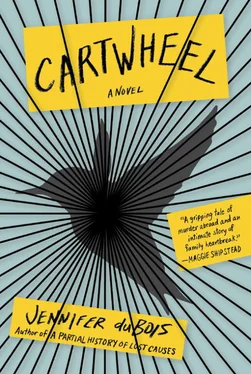“Oh.”
“Is he saying anything interesting?”
“I don’t know. I mean, I guess probably not.”
Andrew rose and went to the window. He leaned his head against the glass. Outside, the light was sepulchral and thin, and Andrew remembered the light from his dreams: the sun tilting through the clouds, casting vast lattices of shadow on the ground; Andrew, above it all, skimming over stands of majestic northern firs, great meadows of allium flowers, rattling trains on trestle bridges. In the dream, Andrew was always struck by how easy it was to do all of this. He was always amazed that he had not done it earlier.
Andrew turned back around and found that Anna was frowning at him. “Am I supposed to ask you if you’re okay?” she said.
This, Andrew knew, was not an expression of genuine concern. It was a tactic of confrontation, inherited from Maureen and based on the premise that the speaker had silently suffered more than you had—more than you could ever even imagine someone suffering—and that condescending to deal with your weakness now was merely the latest trial to be endured with superior resilience and grace.
“I am okay,” said Andrew. “Of course I’m okay. Obviously, it’s probably not great about your sister’s hair.”
“Well, I mean, it’s the kind of thing she probably would have done to herself anyway.” Anna grabbed the remote and turned up the volume on the TV. “She’s always been weird.”
Andrew considered this. Had Lily been weird? She was high-spirited, certainly, and maybe there were times when that had put her out of sync with her peers in various small ways. It was true she hadn’t worn a bra until a bit later than she should have—this had been a point of principle, and she’d been earnest and humorless on the matter—and there had been something a little strange, and more than a little funny, about a child so young fighting a battle so old and so lost. But that only meant that she had ideas of her own. Andrew, through his squeamishness, had even been a little proud of her. “Weird?” he said. “You think so?”
Anna raised her eyebrows and said nothing.
“How do you mean, ‘weird’?” said Andrew. Lily was a little socially awkward, maybe; it was possible that she wasn’t quite as naturally intuitive about other people as girls were usually expected to be. He remembered a phone call from her sometime during her freshman year in which she’d complained about an entry-level political science class. She couldn’t do it, she said, because she couldn’t figure out what worked for people—why were certain slogans effective and others ineffective, why were some unguarded moments seen as winningly humanizing and others as gaffes, why did people trust certain politicians and mistrust other ones? Why, she wondered, had “It’s the economy, stupid” resonated so widely as a phrase?
“Well,” Andrew had said, “I suppose because it was the economy, stupid.”
“That doesn’t really matter with that stuff, though,” said Lily. “It was just some magic formula or something.”
“Is that the kind of thing they’re teaching you there?” he’d said worriedly.
“I don’t know how you do it,” she’d said. “How do you ever guess what people are after?”
“I don’t,” he’d said. “I guess what states are after. Much easier. They behave like cue balls.”
On the TV, the show had gone to a commercial, and Anna’s eyebrows were floating farther and farther toward her hairline. “Never mind, Dad,” she said. “If you guys never saw it, I’m not going to be the one to tell you.”
“Anna,” Andrew said sternly. “You are clearly trying to say something. I would like to know what it is.” Lily was maybe a tad socially inept—but that wasn’t “weird,” per se, as Anna so uncharitably put it. And she was maybe a tad smarter than the bunch, which made the bunch a bit inaccessible to her—but that was certainly not an extraordinary state of things. And anyway, the gulf between Lily and most people was very, very slim: She was smart, but she was not as smart as she thought she was. A slight overestimation of one’s intellect was a useful sort of self-deception, Andrew thought; it pushed a person toward confidence and risk taking and high standards. This was a quality that Andrew had seen countless times in his boy students and almost never in the girls, and so he couldn’t help but find it somewhat endearing in a daughter.
Anna stared at the television. If she did not want to answer, Andrew had no idea how he was going to make her. But then she turned to him, her eyes full of a terrible adult patience that he had never seen before. “Do you remember,” she said, “when Lily killed that animal?”
Andrew began to laugh, but he could hear that his laugh sounded frightened. “No,” he said.
“It was a banana slug or something. You really don’t remember?”
“A slug? Why would I remember something like that?”
“She and her friend killed it.”
“I see.”
“They found it in the backyard. She was seven, I think.”
“And this slug,” said Andrew. “Its significance was what, precisely? Was it a special pet of ours? A work colleague of your mother’s?”
“It was Lily’s idea. She kind of goaded her friend into it. It was pretty disturbing.”
“Disturbing? Come on, Anna. If she was seven, you were what, five? I’m not sure your concept of disturbing was at its most sophisticated.”
Anna shrugged. “She liked killing it. You could tell.”
Andrew could hear how little Anna expected him to believe her, and how little she cared that he wouldn’t, and he felt, suddenly, an overwhelming, choking sadness that turned to anger in his voice. “Oh, and what?” he said. “You’re going to tell me next she was wetting the bed and setting fires while I wasn’t looking, too? It was a slug, Anna. Put it in perspective. Killing a slug is not torturing a puppy.”
“I don’t think you would have noticed if she was doing that, either.”
“Jesus Christ!”
“I’m not saying she was doing that,” said Anna. “She wasn’t. I know that because I know what she was doing and I know what she was like.”
“Have you been feeling unattended to lately, Anna?” said Andrew. “Are you maybe a little jealous of your sister right now?” He knew this could not be a useful thing to say, but he was angry, and he had long ago decided never to yell or raise his voice when angry. Losing your temper never made your case for you; it only made you sound foolish and sputtering and inarticulate—whenever Andrew heard people bellowing sloppily into their cell phones he couldn’t help but think how much more serious their anger would seem if they could keep it calm and well reasoned and under control. When Andrew was angry, he tried to be communicative and nondefensive, to explain intentions and interpretations, to make “I” statements. He tried never to let aggression bleed into unsullied areas; he tried to keep hostility quarantined, the better to effect its excision. But not even Andrew could be calm all of the time, and when he felt himself becoming too angry to stay that way, he had a signature tactic of his own: attempting to ascertain the true origins of his opponent’s behavior. This move had the benefit of seeming completely high-minded (nearly academic, even), communicating how completely irrational he found the other person’s behavior (so totally beyond the pale of comprehension that he could only assume—indeed, he had to assume—that there were other dark forces at work within them), and being, of course, impossibly maddening, all at the same time.
“I’m sure this trip has been hard on you,” said Andrew. At least you’re not unjustly detained in a foreign country! he wanted to scream. At least you’re not dead! Because it could be a whole lot worse than this, Anna, Old Sport . “I know we’ve been very focused on Lily. And maybe you’re not getting what you need from us right now. But, sweetheart, this is not the right way to act out. This is not the right thing to do with those feelings. This is not a good way to get attention.”
Читать дальше












